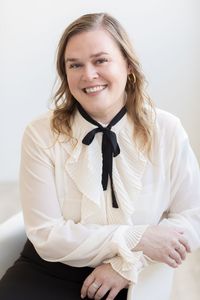GTU Communications
Interview | Meg Mercury, Presidential Scholarship Recipient
Meg Mercury is a recipient of the Presidential Scholarship for the 2023-2024 academic year. Meg will study in the department of Historical and Cultural Studies of Religion. They hold a M.A. in Religion & Theology and a M.A. in Directed Studies from United Theological Seminary of the Twin Cities.
GTU: What were the formative influences in your life—people, places, experiences—that led you to where you are today
Meg Mercury: I like to tell people that I got peer-pressured by a friend who was already in seminary into doing my Master's degrees during a time in my life when I was in dire need of a purpose; I had an idea that I would maybe get an M.Div. and go into nonprofit work or possibly chaplaincy, but I didn't have a very specific plan when I started. I grew up with two ordained ministers for parents, and as a result was absolutely certain that theological studies were of no interest to me. My Bachelor's degree is in English, and I never considered myself a strong academic, so I was deeply surprised when my theology courses turned out to be the most exciting and compelling classes I got to take. I course-corrected in the first trimester of my degree program to an M.A. in Religion and Theology, and received a lot of encouragement from my professors to pursue academic theology.
GTU: How would you describe your academic interests?
MM: I am very interested in the American philosophical tradition, especially the work of William James and his influence on Alfred North Whitehead, and later Chicago schoolers like Bernard Loomer. In a related vein, I am also drawn to some contemporary arguments for a form of pantheism (such as in the work of Mary-Jane Rubenstein and Demian Wheeler, respectively), and its profound implications for eco-theology. In my master's program I began asking myself how creative literature can be a resource for constructive theology that is environmentally just, so the intersection of literature and theology, and more broadly, aesthetics, is something I am drawn to as well.
GTU: What drew you to attend GTU for your Doctoral studies?
MM: My academic interests probably make this clear, but interdisciplinarity is a high priority for me! I also come from a seminary that had a religiously plural student body, a strong commitment to justice, and a robust arts and theology program; I found this combination of factors really fertile for theological study, and was excited to discover that GTU could offer them as well. One of my professors at the seminary is a GTU alum, and he had glowing things to say about his time at the GTU. And, finally, the number one piece of advice I received when I was applying to doctoral programs was to try to find the right advisor to work with; I had the opportunity to meet Devin Zuber about a year ago, and was encouraged not only by the overlap of many of our scholarly interests, but also in the evident care he takes with his advisees. When he described GTU to me as "Montessori for theology students," I knew it would be a good fit.
GTU: What are you most looking forward to in your Doctoral studies at the GTU?
MM: I am really excited to be in the classroom, learning not just from our faculty but also from my fellow students. It was a bittersweet realization that this is probably going to be my last degree, so I feel like I really have to savor these last couple years of classes. I am also over the moon about library access, not just at GTU but at Cal as well.


